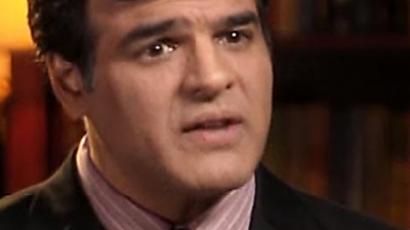Snowden reportedly retained high-ranked lawyer to negotiate return to the US

Could Edward Snowden be coming home? The former intelligence contractor retained a well-known attorney with expertise in the United States Espionage Act last summer in hopes of reaching an agreement with the US government, the New York Times reports.
On Tuesday, Times journalists Charlie Savage and Matt Apuzzo wrote that the 30-year-old ex-systems administrator for the US National Security Agency sought the assistance of accomplished DC-based attorney Plato Cacheris last year with the goal of reaching a plea deal with the federal government.
Last May, Snowden flew to Hong Kong from the US to meet with journalists and disclose previously unpublished national security documents pertaining to America’s vast surveillance apparatus and intelligence gathering methods. He publically identified himself as the source of the leak the following month, but by then investigators had already opened a probe into the matter and soon after charged him with espionage. Now facing a maximum of 30 years in prison, Snowden has since late-June resided in Russia where he’s been granted asylum.
A revoked passport has reportedly prohibited him from travelling internationally except to return home, but the Times now claims that Snowden retained the services of Cacheris in order to negotiate a deal that could allow him to enter the US without risking significant jail time.
Savage and Apuzza wrote that sources familiar with the investigation confirmed that Snowden sought out the attorney last year, but Cacheris told the Times only: “It’s not something that I want to discuss, so I have no comment.”
A Marine Corp veteran and a class of 1956 graduate at the Georgetown University Law Center, Cacheris has previously represented a handful of other Americans charged under the US Espionage Act — a World War One-era legislation created to crack down on spies, but since used no fewer than eight times by the Obama administration to prosecute leakers like Snowden.
According to the Times, Cacheris may be able to convince federal prosecutors to downgrade the charges against Snowden to misdemeanors, sparing his client perhaps decades of imprisonment.
Nearly a year after those talks began, however, the journalists wrote “no agreement appears imminent, and government officials said the negotiations remained at an early stage.” The NSA official in charge of investigating Snowden’s leaks previously said he’d be willing to negotiate however, and US Attorney General Eric Holder said in January that the Justice Dept. would “engage with [Snowden's] lawyers” over a plea deal, but that “clemency isn't something that we were willing to consider.”
Snowden said previously that he wishes to return the US, but was concerned he’d be unfairly convicted of spying and subjected to the same treatment as other leakers who dared to expose government secrets during the Obama administration’s relentless pursuit of whistleblowers under the Espionage Act.
Also an issue of concern, Snowden has said, is the inability of so-called whistleblower protection laws to do just that should he return home.
"One of the things that has not been widely reported by journalists is that whistleblower protection laws in the US do not protect contractors in the national security arena,” Snowden said during an online question-and-answer session hosted in January. “There are so many holes in the laws, the protections they afford are so weak, and the processes for reporting they provide are so ineffective that they appear to be intended to discourage reporting of even the clearest wrongdoing. If I had revealed what I knew about these unconstitutional but classified programs to Congress, they could have charged me with a felony. One only need to look at the case of Thomas Drake to see how the government doesn’t have a good history of handling legitimate reports of wrongdoing within the system.”
Drake — also a former NSA insider charged with espionage for going to the press with information about government abuse — faced 35 years in prison until prosecutors agreed to let him plea to a charge that allowed him to escape jail time entirely. He is among the eight individuals charged by US President Barack Obama under the Espionage Act, and has in the last year has identified himself as strong supporter of Edward Snowden.
Others among the “Espionage Eight” have not been so lucky — WikiLeaks source Chelsea Manning began serving her three-and-a-half-decade prison sentence last summer, and Central Intelligence Agency leaker John Kiriakou is in the midst of a 30-month stint for confirming to the press the name of an undercover CIA agent.
On Cacheris’ part, the son of Greek immigrants has earned a reputation for defending other Espionage Act defendants, such as former Federal Bureau of Investigation agent Robert Hanssen and former CIA agent Aldrich Ames — two individuals convicted separately of spying for Soviet and Russian intelligence and each sentenced to life imprisonment as a result.
Jesselyn Radack — a Department of Justice whistleblower and legal advisor to both Snowden and Drake — wrote on Twitter after the Times article was published on Tuesday that Cacheris’ previous cases aren’t fair comparisons to the Snowden saga.
Key difference is Hanssen & Ames were actual spies, who sold secrets to enemy for profit. #Snowden's not. http://t.co/KPQAeRWCiA#espionage
— Jesselyn Radack (@JesselynRadack) April 29, 2014
The “key difference,” she wrote, is Hanssen and Ames “were actual spies, who sole secrets to enemy for profit. Snowden’s not.”
Last December, in fact, Snowden told journalist Barton Gellman that his personal mission was “already accomplished” only six months after the first NSA story broke.
“I already won,” Snowden said. “As soon as the journalists were able to work, everything that I had been trying to do was validated. Because, remember, I didn’t want to change society. I wanted to give society a chance to determine if it should change itself.”
“All I wanted was for the public to be able to have a say in how they are governed,” he said. “That is a milestone we left a long time ago. Right now, all we are looking at are stretch goals.”
Indeed, an international debate about surveillance was undoubtedly kick-started by Snowden’s revelations, and the door for potential reform has been opened both in the US and abroad. The question now, it would seem, is in the door open for Snowden to come home?
“Snowden is interested in returning home,” American Civil Liberties Union lawyer and legal advisor for Mr. Snowden Ben Wizner told the Times for this week’s article. “He is and always has been on America’s side. He would cooperate in extraordinary ways in the right circumstances. But he does not believe that the ‘felon’ label is the right word for someone whose act of conscience has revitalized democratic oversight of the intelligence community and is leading to historic reforms.”














